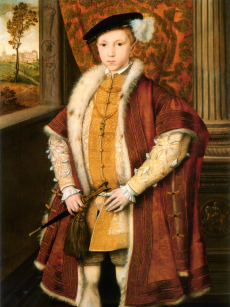
Email: EllaTournes@bexleygs.co.uk
Total Article : 45
About Me:Sixth form student currently studying English Literature, Drama and Theatre Studies, Classical Civilisation and History.

There is a lot of controversy over how much influence Edward VI himself had over the reign of Edward VI. When he ascended to the throne, Edward was just nine years old. Orthodox historians say that he was also seen as a boy of frailty and fairly weak health. Henry VIII had carried the Tudor dynasty on by providing a male heir, but there were concerns about ‘how long he’d last’. Revisionist historians say that apart from a ‘quartan fever’ at the age of four, Edward was a healthy child. Either way, the young King was deemed far too young to make his own decisions regarding anything of importance. In his, Henry VIII expressed a desire for Edward VI’s reign to be led by sixteen named executors, forming a ‘Council of Regency’, to be supplemented by twelve men ‘of counsail’. There was never a mention of a Lord Protectorate – a position of almost regal importance, which was adopted by the Duke of Somerset, then the Duke of Northumberland. Throughout the period of Somerset’s Protectorate, Edward VI had limited influence over the policy of his country. However, after the downdall of Somerset, Edward began to play a much more active role. He was the force behind the Second Book of Common Prayer, and the Second Act of Uniformity’.
It has been suggested by historians that Edward’s convictions weren’t radically Protestant, but that, as a young boy who had been robbed of his right to power, he simply enjoyed the power that radical reforms gave him. However, it would make sense for Edward to have Protestant convictions. He had been educated by Protestant tutors, had been made to write essays denouncing the Catholic Church, often writing in the first person, showing how passionate he felt about the subject. His father, a figure whom he respected and seemed to love, had started a Reformation – he seemed determined to finish it.
Edward VI was instrumental in the persecution of Mary Tudor, his sister, and her religious beliefs. In one of his diary entries, dated 1551, he writes about he ‘suffered her mass, in hope of her reconciliation’ but ‘could not bear it’. The emotive language used by Edward shows his passion towards the subject of Mary’s continuing her Catholic worship. He also writes that he ‘did not constrain but willed her only as a subject to obey’. This sentence could be interpreted as Edward wanting to exert his power over his sister, if not for the following sentence – ‘her example might lead to too much inconvenience.’ Edward didn’t want people to follow Mary in her disobedience of the Act of the Six Articles, which compels her to attend Protestant mass, and not to attend Catholic mass.
The source also shows Edward’s increased role of power as he corresponds with the emperor’s ambassador. The emperor ‘threatened war, if (Edward) would not allow (the emperor’s cousin, Princess Mary), to use her mass’. Edward didn’t give the emperor an answer, but the fact that the letter was taken to him, and not the Lord Protector, is significant. However, the source also depicts ‘the bishops of Canterbury, London and Rochester, Thomas Cranmer, Nicholas Ridley and Johnson Scory, concluded that to give licence to sin was sin’. The conclusion of the matter still inherently lies with Edward’s councillors and not Edward’s.
Compared to other Tudor monarchs, the amount of influence that Edward had over religious changes and reformation is underwhelming. Henry VIII’s influence over the Break with Rome was stifling – it didn’t just take place under the guidance of Henry, it happened because of him. Breaking with Rome in 1529 was the only way he’d get to marry Anne Boleyn and divorce Catherine of Aragon without being seen as a sinner. Henry VIII used his influence to onset huge religious changes, claiming jurisdiction over the English Church for himself. Due to the passing of the Act of Supremacy in 1534, Henry VIII was given complete ownership and influence over religion. Here also had huge influence over the Dissolution of the Monasteries in 1536, and used the profit to fund the new Church of England, and for military purposes. On one hand, the changes of Edward VI were arguably more radical and significant – however, Henry VIII’s influence was greater, and the changes benefitted his own personal agenda more than Edward’s did.
Sources:
https://www.google.co.uk/search?q=edward+vi&espv=2&biw=1242&bih=557&site=webhp&source=lnms&tbm=isch&sa=X&ved=0ahUKEwi5jf-N3qrPAhVlDsAKHSGXCB4Q_AUIBigB#imgrc=gpCspYDtpRkKwM%3A

0 Comment:
Be the first one to comment on this article.